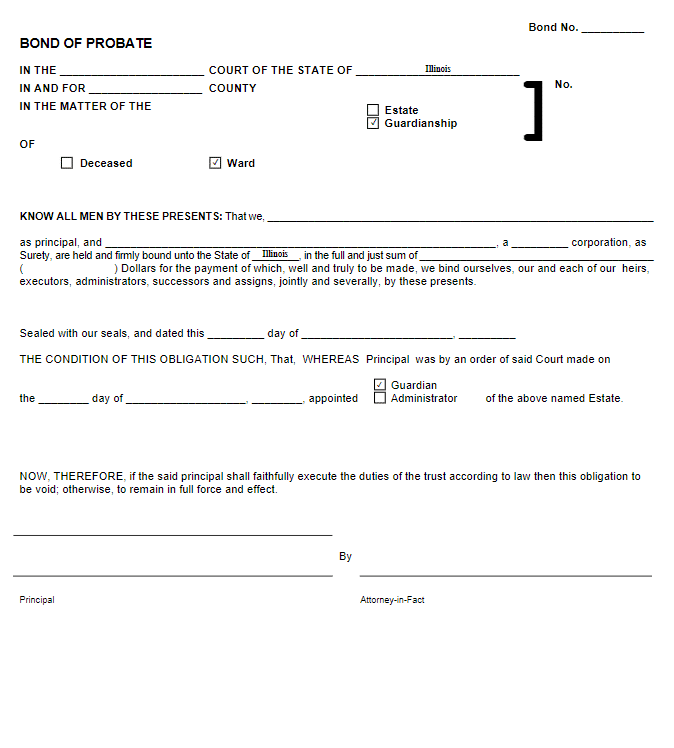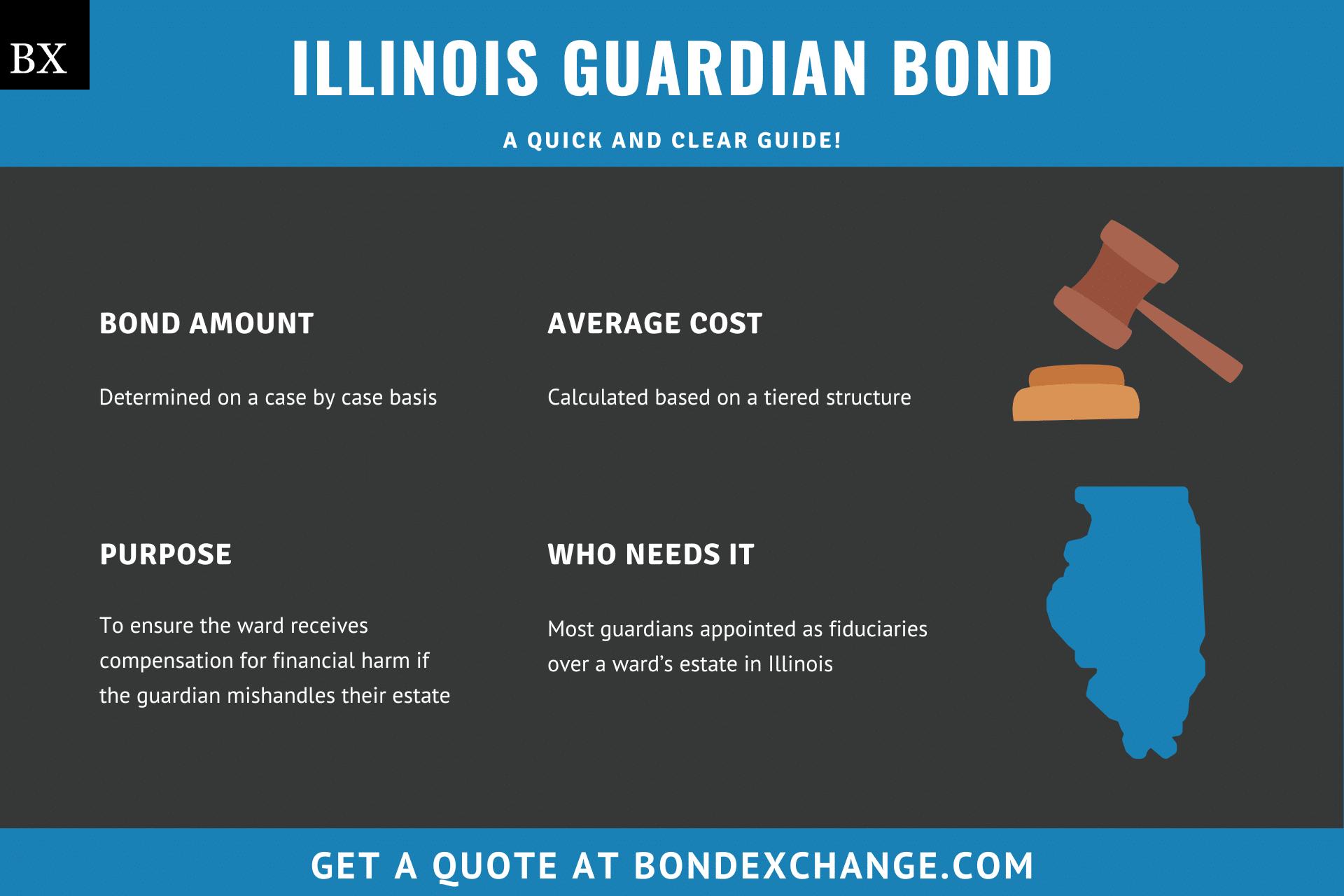Illinois Guardian Bond: A Comprehensive Guide
This guide provides information for insurance agents to help their customers obtain an Illinois Guardian bond.
At a Glance:
- Average Cost: Calculated based on a tiered structure
- Bond Amount: Determined on a case-by-case basis
- Who Needs It: Most guardians appointed as fiduciaries over a ward’s estate in Illinois
- Purpose: To ensure the ward receives compensation for financial harm if the guardian mishandles their estate
- Who Regulates Guardian Bonds in Illinois: The circuit court of the county where the ward resides or has property

Background
Sections 11a-3 and 11-5 of the Illinois Probate Act of 1975 require all guardians to be appointed as a fiduciary by the circuit court of the county where the ward resides. The Illinois legislature enacted the appointment requirement to ensure guardians act in the ward’s best interests when making decisions related to their health or managing their estate. To provide financial security for the enforcement of this requirement, most guardians with decision-making authority over a ward’s estate must purchase and maintain a probate surety bond before becoming appointed as a fiduciary.
What is the Purpose of the Illinois Guardian Bond?
Illinois requires most guardians to purchase a surety bond as a prerequisite to being appointed as a fiduciary over a ward’s estate. The bond ensures that the ward will receive compensation for financial harm if the guardian fails to abide by the regulations outlined in the Illinois Probate Act 12-2. Specifically, the bond protects the ward if the guardian fails to adhere to all court orders or mismanages the estate’s assets.
For example, if a guardian uses money from the ward’s bank account to pay for the guardian’s personal expenses or mixes the estate’s funds with their own, the ward can file a claim against the guardian’s bond to recoup their losses. In short, the bond is a type of insurance that protects the ward if the guardian does not fulfill their fiduciary duties.
How Can an Insurance Agent Obtain an Illinois Guardian Bond?
BondExchange makes obtaining an Illinois Guardian bond easy. Simply log-in to your account and use our keyword search to find the “Guardian” bond in our database. Don’t have a login? Gain access now and let us help you satisfy your customers’ needs. Our friendly underwriting staff is available by phone (800) 438-1162, email or chat from 7:30 AM to 7:00 PM EST to assist you.
At BondExchange, our 40 years of experience, leading technology, and access to markets ensures that we have the knowledge and resources to provide your clients with fast and friendly service whether obtaining quotes or issuing bonds.
Not an agent? Then let us pair you with one!

Click the above image to find a BX Agent near you
How is the Bond Amount Determined?
Section 12-5 of the Illinois Probate Act dictates that the bond amount must be, at a minimum, equal to 150% of the value of the personal property of the estate. If the guardian has control over any of the estate’s real property, the court will increase the bond amount based on the estimated income to be generated by that real property.
If the primary purpose of appointing a guardian is to assist a ward in selling their interest in real estate, the court may waive the bond requirement or may set the bond amount to be in an amount less than $1,000.
Can the Bond Amount be Adjusted?
Yes, as Section 12-7 of the Illinois Probate Act dictates that the court may order the guardian to deposit a portion of the estate with a trust company and lower the bond amount to the value of the remaining assets of the estate in the guardian’s control. Section 12-9 of the Illinois Probate Act also dictates that the court may require an additional bond if the guardian petitions the court to sell or mortgage the ward’s real property, and the additional bond amount must be equal to 150% of the income from the sale.
What are the Underwriting Requirements for the Illinois Guardian Bond?
Most surety companies will examine the following factors when determining eligibility for the Illinois Guardian bond:
- Fiduciary’s credit history
- Whether or not the estate has an attorney
- Whether or not the fiduciary is a family member
- The fiduciary’s occupation
- Whether or not the guardian or conservator is replacing a prior fiduciary
- If the fiduciary has ever committed a felony
- Whether or not there is any ongoing business in the estate
- If a creditor is requiring the bond
- If the bond amount is greater than or equal to the estate’s value
How Much Does the Illinois Guardian Bond Cost?
Surety companies typically determine the premium rate for Guardian bonds based on a tiered structure, so larger bond amounts will be charged a lower premium rate than smaller bonds.
The following table illustrates the pricing structure for the Illinois Guardian bond:
$1,500,000 Guardian Bond Cost
| Bond Amount | Premium Rate | Total Bond Cost |
|---|---|---|
| First $20,000 | 0.75% | $150 |
| Next $40,000 | 0.60% | $240 |
| Next $140,000 | 0.50% | $700 |
| Next $300,000 | 0.375% | $1,125 |
| Next $1,000,000 | 0.25% | $2,500 |
| Total cost of $4,715 |
Who is Required to Purchase the Bond?
Illinois requires most guardians with decision-making authority over a ward’s estate to purchase a surety bond as a prerequisite to becoming a court-appointed fiduciary. To paraphrase Article 1 of the Illinois Probate Act, a “guardian” is an individual or organization appointed as a fiduciary over a ward’s person and/or estate. Additionally, a “ward” is defined as a minor or incapacitated adult that is incapable of making sound decisions concerning their estate and/or well-being.
There are different kinds of guardianships available in Illinois and each one has its own specific circumstances for when a bond is required, as outlined below:
- Guardian of the Person: A guardian authorized to take custody of and provide care for a ward, including making medical and personal decisions on their behalf. In this kind of guardianship, the court will likely waive the bond requirement.
- Guardian of the Estate: A guardian with legal control over the finances and property of a ward. Guardians of the estate are required to obtain a bond.
Guardians are not required to purchase a surety bond, unless explicitly required by the court, in the following situations:
- The guardianship is only for the ward’s person, not the estate
- If the guardian deposits a majority or all of the estate assets with a trust company in Illinois
- A person with the power to nominate a guardian in a will or other similar writing waives the bond requirement
- If the primary purpose of appointing a guardian is to assist the ward in receiving public entitlements

How do Illinois Guardians Become Appointed as Fiduciaries?
Guardians in Illinois must navigate several steps to become appointed as fiduciaries. Below are the general guidelines, but appointees should refer to the appointment statutes or the Illinois Guardianship & Advocacy Commission’s website for details on the process.
Step 1 – Hire an Attorney
Although not explicitly required, it is highly recommended that guardians hire an attorney to assist with the guardianship process.
Step 2 – File All Required Forms
Persons seeking guardianship over a ward must file multiple forms with the clerk of the circuit court of the county where the proposed ward resides. Guardians can obtain the forms from the court and must ensure to make copies prior to submitting.
Guardians must also submit a report from an Illinois physician certifying that the proposed ward is need of guardianship, and will need to pay a filing fee to the court to start the guardianship process.
Step 3 – Deliver the Summons to the Sheriff
In some counties, the clerk of the court delivers the summons and a copy of the petition to the sheriff to deliver to the proposed ward. However, in other counties, the petitioner must deliver the summons to the sheriff and the sheriff will charge a fee to deliver the papers.
Step 4 – Attend a Hearing
Guardians must attend a hearing conducted by the circuit court of the county where the proposed ward resides and present evidence as to why they are in need of guardianship. The court will examine the evidence presented by the guardian as well as that presented by the ward being evaluated (if any) and make a determination as to whether or not guardianship is necessary.
Any interested person can apply to the court to participate in the hearing. If the court finds a basis for the appointment, it will issue a letter of guardianship to the petitioner.
Step 5 – Purchase a Surety Bond
Unless otherwise exempt, guardians with decision-making authority over a ward’s estate must purchase and maintain a surety bond (limits outlined above).
How do Illinois Guardians File Their Bonds?
Guardians should file their completed bond forms, including the power of attorney, to the clerk of the circuit court of the county where the ward resides.
The surety bond requires signatures from the company that issues the bond and the conservator. The surety company should include the following information on the bond form:
- Legal name of the entity/individual(s) buying the bond
- Surety company’s name and state of incorporation
- Bond amount
- Date the bond is signed
- Date of the appointment
- Type of fiduciary relationship
- Name and county of the circuit court
What can Illinois Guardians do to Avoid Claims Made Against Their Bonds?
To avoid claims against their bonds, guardians in Illinois must ensure that they:
- Perform all of their fiduciary duties
- Obey all court orders
- Do not mismanage the ward’s property
